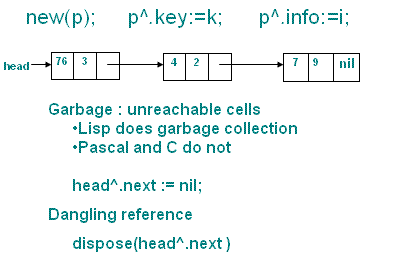Dynamic Storage Allocation

Generally languages like Lisp and ML which do not allow for explicit de-allocation of memory do garbage collection. A reference to a pointer that is no longer valid is called a 'dangling reference'. For example, consider this C code:
int main (void)
{
int* a=fun();
}
int* fun()
{
int a=3;
int* b=&a;
return b;
}
Here, the pointer returned by fun() no longer points to a valid address in memory as the activation of fun() has ended. This kind of situation is called a 'dangling reference'. In case of explicit allocation it is more likely to happen as the user can de-allocate any part of memory, even something that has to a pointer pointing to a valid piece of memory.
|